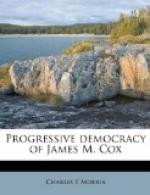“Therefore, gentlemen, let us make up a budget which will carry the full details and information—recounting the legitimate expenses of this campaign, render an accounting daily or weekly, and the source from which it came. And more than that, we shall insist upon the senatorial investigating committee continuing in session until the ballot has been closed in November. You know full well that a campaign fund sufficient in size to stagger the sensibilities of the nation is now being procured by our opponents. If they believe that is correct in principle, God speed them in the enterprise, It will be one of our chief assets in this campaign.”
This, then is the record.
CHAPTER IX
THE LIFE STORY
Born at Jacksonburg, Ohio, March 31, 1870, son of Gilbert and Eliza Cox; educated in public schools; reared on farm; worked in printer’s office; taught country school; became newspaper reporter; secretary to Congressman Sorg, 3d Ohio District; bought Dayton Daily News, 1898, and Springfield Press Republic, 1903, forming News League of Ohio; member 61st and 62d Congress (1909-13), 3d Ohio District; Governor of Ohio; elected in 1912, defeated in 1914, elected in 1916 and 1918; now serving third term; home, Trailsend, Dayton.
The family of Cox seems to have had its origin in England in the generations gone, but its Americanism is of two centuries in duration. At Freeboard, New Jersey, lived General James Cox, one of the early speakers of the New Jersey House of Representatives and later a member of Congress. Tillers of the soil and artisans, the closer forbears attained to no distinction in public life. To Ohio the family came sometime in the early years of the last century, and at Jacksonburg the paternal grandfather, Gilbert Cox, established himself. On the ancestral farm of 160 acres, his son, Gilbert, Jr., lived, and on it James M. Cox first saw the light of day. His uncles and aunts, for his father was one of a family of thirteen, were of the people who migrated westward. The youngest of a family of seven children, he learned the routine of tasks of a boy on the farm. In the little one-room country school he attended, his teachers found him an ordinary pupil but with a fondness for newspaper reading.
Cox’s first public job was the humble position of janitor in the United Brethren Church, and even now his favorite reminiscence is the difficulty he had in making the old wood stove function properly. The thrifty farmers in those days were accustomed to commute part of their dues in cord wood for the church, and often the quality they supplied was not of the best. The boy became a member of the Church, a membership which is still retained.




